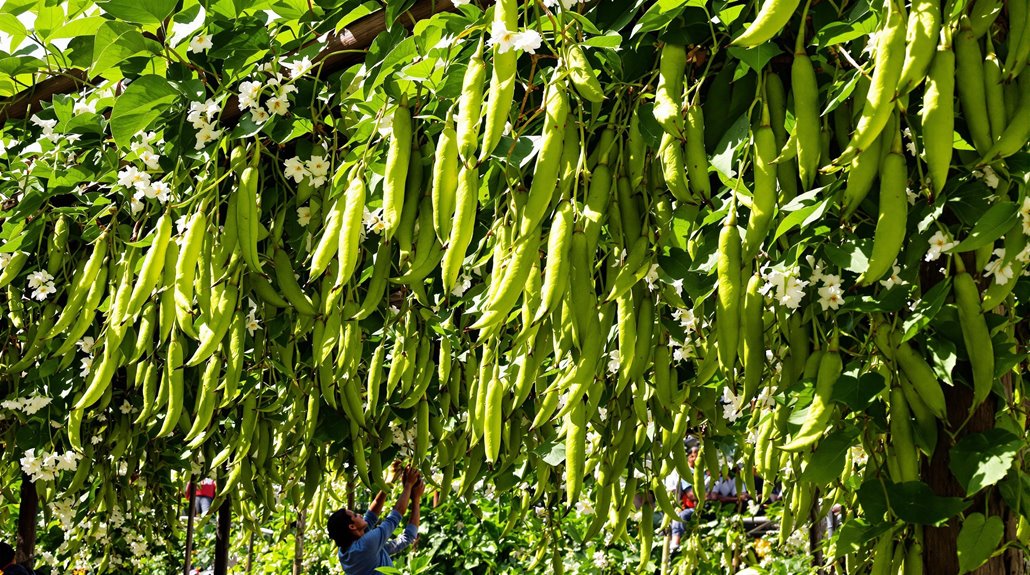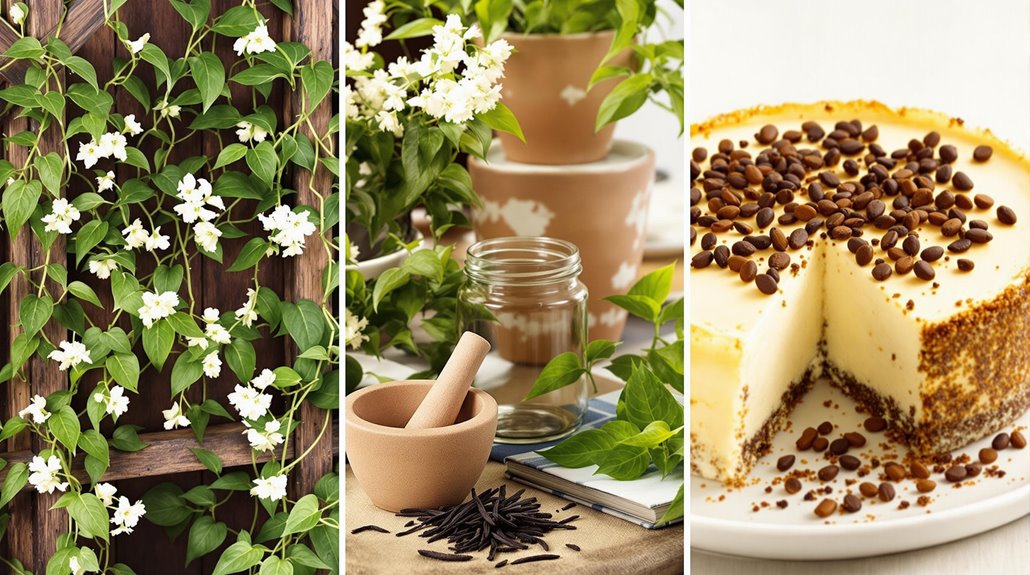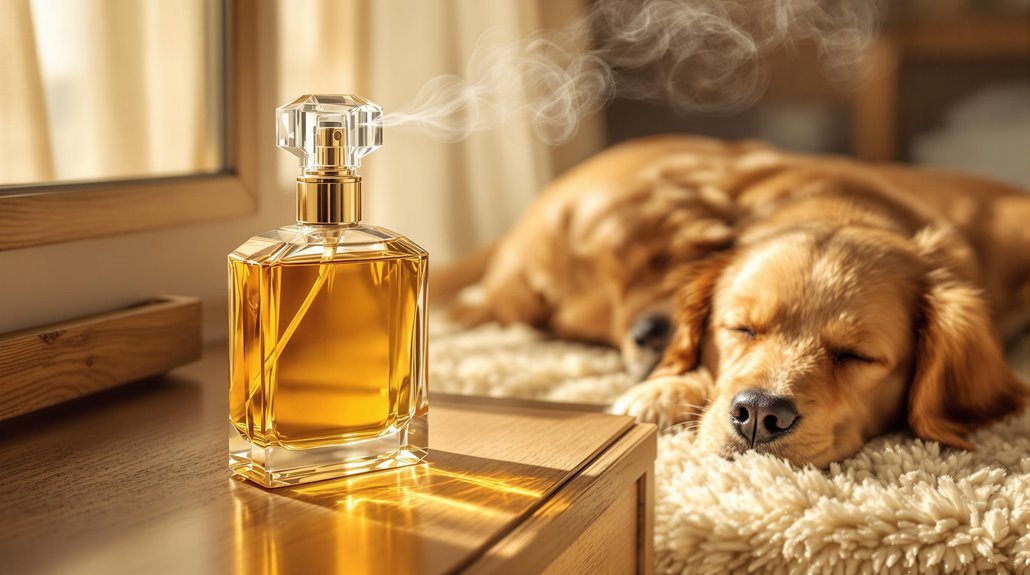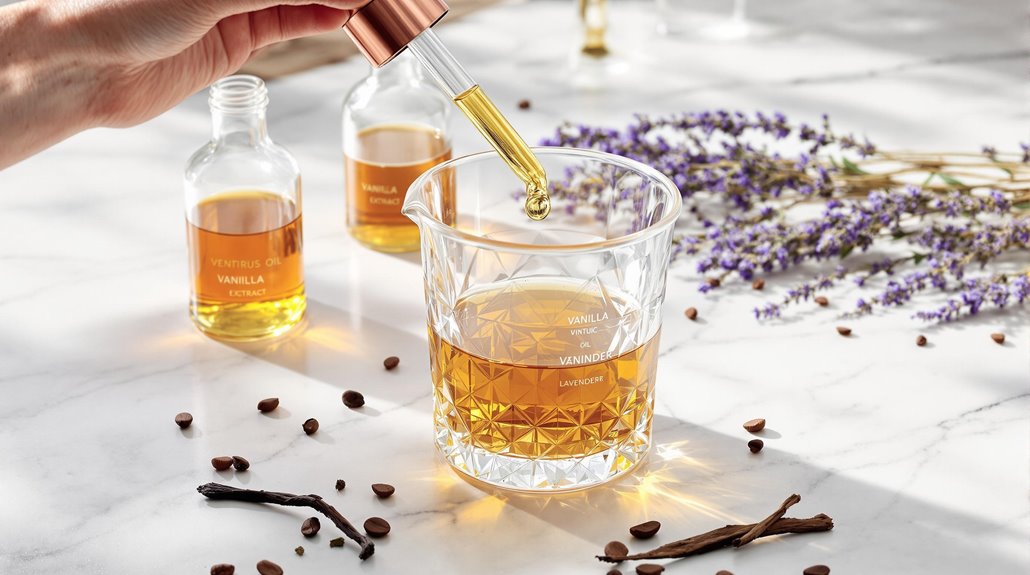What Makes Madagascar Vanilla So Special?
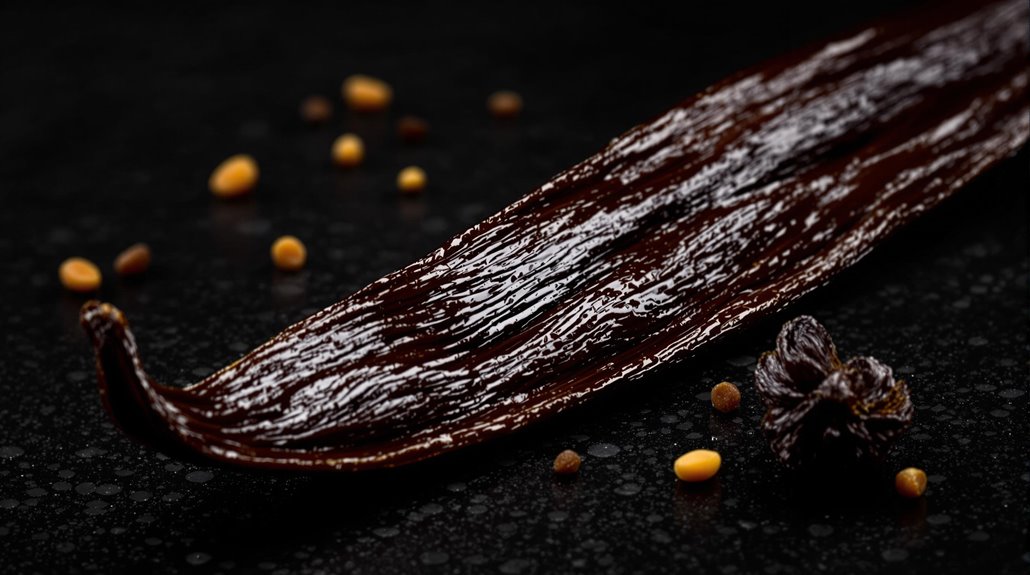
Madagascar's vanilla is truly one-of-a-kind. Its tropical climate, fertile volcanic soils, and lush rainforest setting create the ideal growing conditions. Skilled Malagasy farmers hand-pollinate each delicate flower and meticulously cure the pods, unleashing their unparalleled complexity of flavor and aroma. This rich cultural heritage and centuries-old expertise make Madagascar vanilla the world's most sought-after spice, enthralling chefs and food enthusiasts alike.
No wonder it commands such a high global market value - and if you'd like to investigate more about this exceptional ingredient, there's plenty more to delve into.
Ideal Growing Conditions
The vanilla plant thrives in a tropical climate, requiring specific environmental conditions to produce its prized pods. You'll find that the fertile volcanic soils of Madagascar provide the ideal soil health needed for the vine's sturdy growth. With its optimal rainfall distribution of 50-100 inches per year, the island's tropical rainforest setting maintains the moisture levels the plant desires.
Vanilla's delicate flowers must be pollinated by hand, a labor-intensive process that Malagasy farmers have perfected over generations. The resulting pods mature over several months, developing their signature flavor and aroma. This detailed care results in the world's most prized vanilla, coveted for its superior quality. As you'll uncover, it's this unique terroir that makes Malagasy vanilla unlike any other, a true standout in the spice world. Similar to essential oil extraction, the process of cultivating and harvesting vanilla requires careful attention to environmental conditions and proper maintenance techniques.
Traditional Harvesting Techniques
Skilled Malagasy farmers carefully hand-pollinate each vanilla flower, a delicate process they've perfected over generations. This labor-intensive process is vital, as vanilla plants rely on specific pollinators found only in their native habitat. After pollination, the farmers patiently wait for the pods to mature, a time-consuming preparation that can take up to nine months.
Once the pods are ready, the harvesting begins. The farmers painstakingly hand-pick each pod, ensuring they're at the perfect ripeness. They then carefully submerge the pods in hot water, a process that kickstarts the curing and drying stages. Over the following weeks, the pods are laid out in the sun, then bundled and conditioned to develop their signature deep, rich aroma and flavor.
This traditional, precise approach is what makes Madagascar vanilla so coveted worldwide. The effort and craftsmanship of these skilled growers are truly what raise this spice to a level of unparalleled quality. The dried beans develop tiny vanillin crystals that create the sweet, rich aroma Madagascar vanilla is famous for.
Rich Cultural Heritage
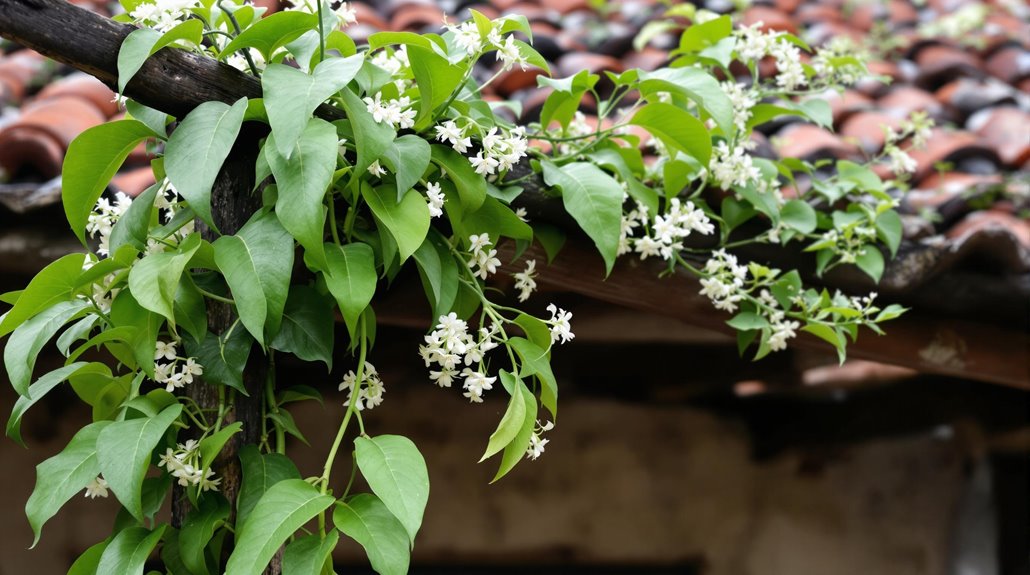
For generations, the Malagasy people have deeply woven vanilla cultivation into their cultural identity. Their ancestral traditions have nurtured a sustainable, artisanal approach to farming this prized spice. You'll find that the rich cultural heritage of Madagascar's vanilla growers is what truly sets their product apart:
- A deep reverence for the land, passed down through generations of stewardship
- Intimate knowledge of the vanilla plant's ideal growing conditions and harvesting techniques
- A strong sense of community, with farmers working cooperatively to bring the finest vanilla to market
- A commitment to environmental preservation, ensuring a bright future for this iconic Malagasy crop
This cultural tapestry is the beating heart of Madagascar's vanilla industry, providing a product imbued with authenticity, tradition, and a timeless connection to the island's unique terroir. Like the ancient sandalwood forests of East Timor that have been cherished since 1436, Madagascar's vanilla cultivation represents a profound historical legacy.
Flavor and Aroma Complexity
Madagascar's vanilla boasts an unparalleled complexity of flavor and aroma. The deeply nuanced characteristics of this prized spice are a result of the island's unique growing conditions. The vanilla orchids thrive in the lush, tropical climate, absorbing the rich, mineral-dense soil to produce an enticing aromatic profile.
The curing process further enhances the flavor, altering the green pods into the signature dark, shiny beans. Notes of sweet, creamy, and floral mingle with hints of spice, providing a captivating sensory experience. Whether used in baking, cocktails, or even savory dishes, Madagascar vanilla accentuates the entire culinary experience.
Its complexity is unmatched, with layers of flavor that unfold with each taste. From the first inhale to the final linger, Madagascar vanilla enthralls the senses, offering a truly unique and indulgent taste of the island. The presence of 200 distinct compounds contributes to its exceptional antioxidant properties and distinctive flavor profile.
Demand in Culinary World
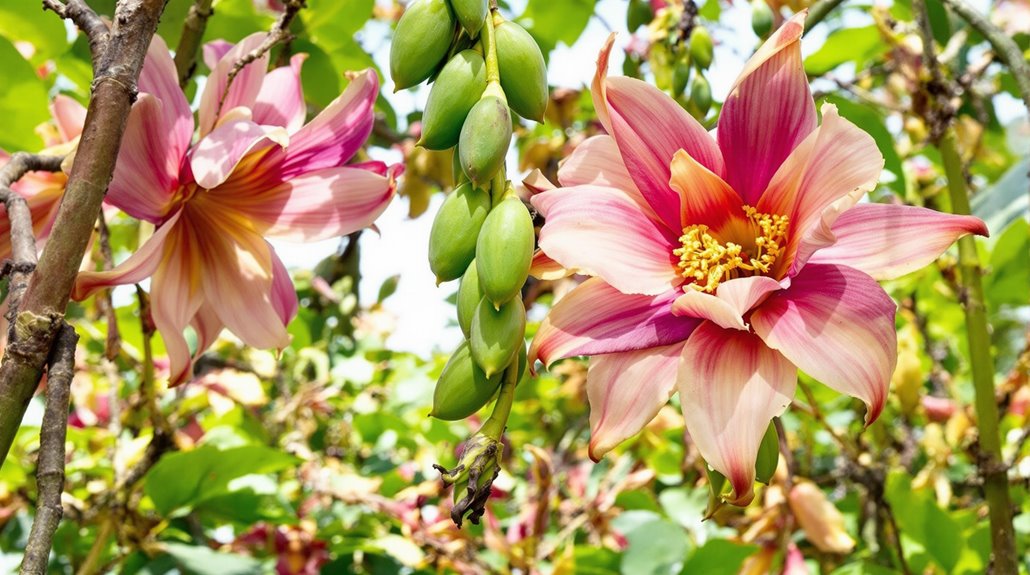
Heightening the culinary world's demand for Madagascar vanilla is its unparalleled reputation. From haute cuisine to humble baked goods, chefs and home cooks alike prize this coveted spice for its unmatched flavor and aroma.
The global popularity of Madagascar vanilla is undeniable, commanding premium pricing that reflects its scarcity and quality. This highly sought-after ingredient has become a hallmark of excellence in the culinary sphere:
- Madagascar vanilla's complex, rich, and refined flavor profile sets it apart, elevating even the simplest of dishes.
- Its natural vanilla notes, with hints of sweet, creamy, and floral undertones, make it a versatile and indispensable addition to both sweet and savory recipes.
- The meticulous, labor-intensive curing process endowed by Malagasy farmers further enhances Madagascar vanilla's depth of flavor.
- This premium spice has become a symbol of culinary sophistication, a must-have for discerning chefs and food enthusiasts worldwide.
Like aromatic ambiance creation, the alluring scent of Madagascar vanilla can transform any kitchen space into a warm and inviting environment.
Hand-pollination Process
Ensuring the quality and quantity of Madagascar's prized vanilla relies on a delicate, intricate process - hand-pollination. This labor-intensive process is a pivotal aspect of small-scale vanilla production in Madagascar. Each vanilla flower must be manually pollinated, as the natural pollinators, such as bees and hummingbirds, are not native to the island.
The process begins with the carefully timed opening of the vanilla flower, which only lasts for a single day. Experienced workers then use a small stick or their fingers to transfer the pollen from the male to the female parts of the flower, a task requiring exceptional dexterity and precision. This painstaking work is repeated for every flower, guaranteeing the development of the coveted vanilla bean.
The hand-pollination process is not only time-consuming but also physically demanding, with workers spending long hours in the fields to ensure a bountiful harvest. This dedication and attention to detail are what make Madagascar's vanilla truly exceptional, contributing to its unparalleled flavor and aroma. Similar to how sandalwood's natural properties promote healing and regeneration, the careful hand-pollination process ensures the highest quality vanilla production.
Meticulous Curing of Pods
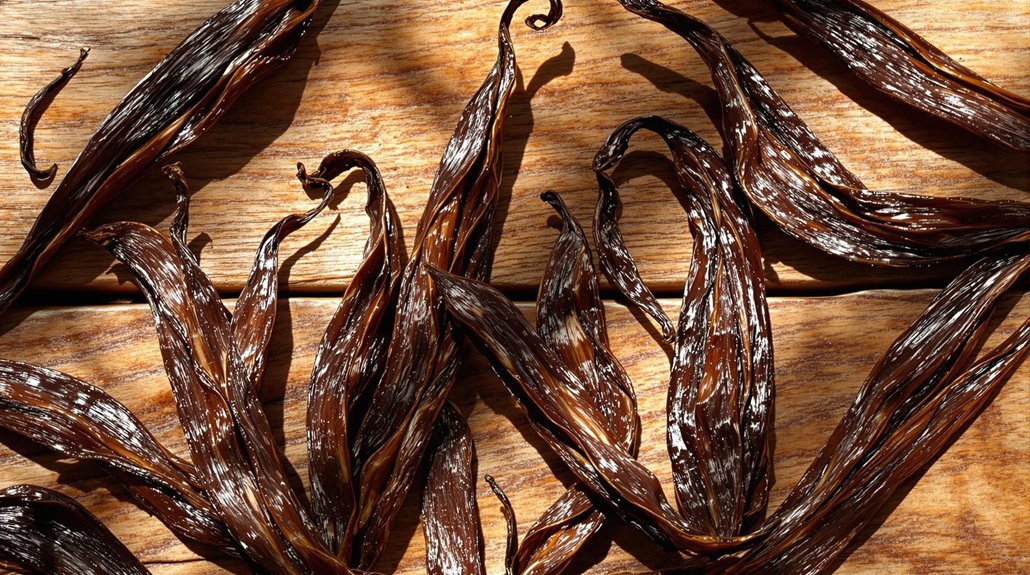
After the labor-intensive hand-pollination process, the real work of curing the precious vanilla pods begins. This meticulous curing process is paramount for unlocking the rich, complex flavors that make Madagascar vanilla so sought-after.
Skilled harvesters carefully monitor the drying techniques, ensuring the pods are slowly and evenly dried in the warm island sun. This gradual drying process can take up to six months, as the harvesters vigilantly check the pods daily, gently manipulating them to prevent mold and maximize the development of the coveted vanillin compound.
Once dried, the cured pods undergo rigorous storage practices, where they are meticulously sorted, graded, and stored in temperature-controlled environments to preserve their exceptional quality. This level of attention to detail is what sets Madagascar vanilla apart, making it the gold standard in the global spice market.
Much like the therapeutic art form of candle making, the vanilla curing process requires patience, dedication, and a deep appreciation for craftsmanship.
- The curing process is a true test of patience and expertise.
- Meticulous drying techniques unlock the complex flavors.
- Vigilant storage practices preserve the exceptional quality.
- Every step is paramount in creating the world's finest vanilla.
Optimal Balance of Climate
Madagascar's vanilla production thrives on the island's delicate climatic balance. The region's seasonal variations and microclimate conditions create an ideal environment for cultivating the world's finest vanilla. During the wet season, the warm, humid air and frequent rainfall provide the perfect conditions for the vanilla orchids to bloom and develop their signature flavor compounds. As the dry season approaches, the cooler temperatures and lower humidity levels allow the pods to cure slowly, concentrating those same aromatic compounds. This perfect balance of wet and dry periods is essential for producing Madagascar's rich, complex vanilla. Growers must carefully monitor the weather patterns and adjust their harvesting and curing techniques accordingly.
Any disruption to this carefully tuned system can compromise the quality and unique character of the finished product. It's this delicate equilibrium that sets Madagascar vanilla apart, making it the gold standard in the global spice trade. Similar to how sandalwood oil production requires trees to age at least 15 years for optimal fragrance development, vanilla pods also need precise timing and conditions to achieve their finest quality.
Generations of Expertise
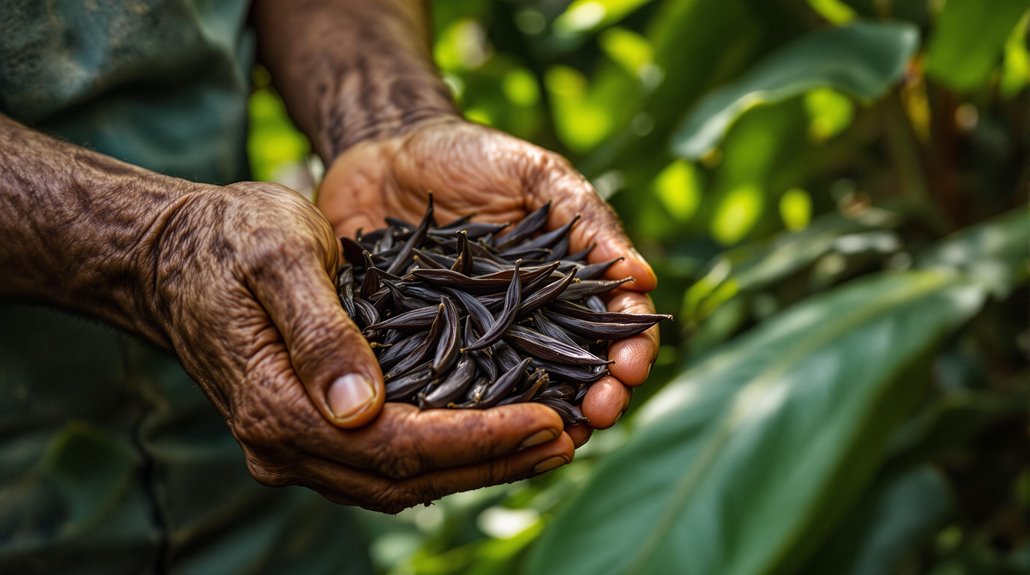
Generations of vanilla farmers in Madagascar have honed their craft over the centuries. They've perfected innovative farming methods that coax out the finest flavor from each pod. Their unique processing practices, passed down through the generations, guarantee the vanilla's aroma and taste are preserved to perfection. Similar to how white sandalwood oil requires careful steam distillation to preserve its distinctive properties, these farmers employ meticulous extraction methods.
- The deep respect for tradition and commitment to quality have made Malagasy vanilla renowned worldwide.
- Farmers carefully tend to their vanilla vines, hand-pollinating the delicate flowers and painstakingly curing the pods to bring out their signature notes.
- Processing techniques, like sun-drying and conditioning, are executed with precision, elevating the vanilla's complexity and richness.
- This generational know-how, combined with Madagascar's ideal growing conditions, creates a vanilla that is unparalleled in depth and character.
Prized Ingredient Qualities
The vanilla from Madagascar is prized for its exceptional qualities. It's no surprise that this Indian Ocean island nation produces some of the world's most coveted vanilla, as the unique terroir factors create the perfect conditions for cultivating this sought-after spice. The global market value of Madagascar vanilla is sky-high, with its distinct flavor profile and exceptional aroma making it a highly desirable ingredient for chefs, bakers, and food manufacturers worldwide.
The long, thin vanilla beans from Madagascar are known for their intense, rich, and creamy flavor that's unmatched by other growing regions. This is largely due to the island's tropical climate, volcanic soil, and painstaking cultivation and curing practices passed down through generations of experts. The result is a vanilla that's luxuriously fragrant, with notes of chocolate, caramel, and a slight floral undertone that enhances any dish or recipe it's used in. Beyond its culinary applications, Madagascar vanilla serves as an excellent natural air freshener, providing therapeutic benefits that promote relaxation and stress relief.

